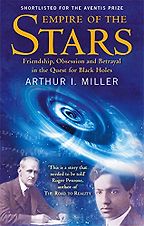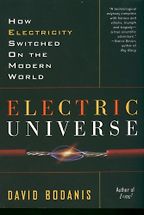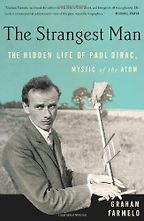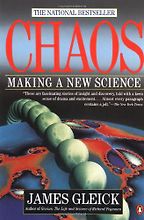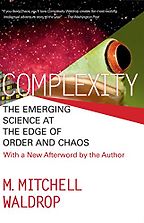Your choice of Empire of the Stars seems to offer a gentle way in to popular science. A story of scientific rivalry around the discovery of white dwarfs, it’s seen entirely through a biographical lens and a single relationship: that of Subrahmanyan Chandrasekhar and Sir Arthur Eddington. So why is Chandrasekhar’s life such an interesting one to look at in terms of understanding science through biography?
I think there are three things about this book that make it particularly interesting. First of all there’s the iconic event in Chandrasekhar’s early life which we’d all like to emulate as theoretical physicists. It happened when he was only 19 and on the boat from India to England, and this was around the beginning of quantum mechanics. Using some paper that he had to hand, he tried to work out what would happen at the centre of stars and arrived at this idea called the Chandrasekhar mass, which is: if a star is heavier than the Chandrasekhar mass then it may collapse into a black hole.
Now he had had some pretty good formal training in India, but no high-level training. To me that is sheer brilliance: to get hold of simple concepts and come out with something groundbreaking. That’s the first reason I think he’s interesting. Secondly, the context of the story is Empire and colonialism. The relationship is between this guy who comes from India to Cambridge and the grand figure of Eddington, and the denouement – why Chandrasekhar is not taken seriously – is completely tainted by colonial strategies. I think that’s interesting as a picture of the world at the time. And the third thing is, I’ve just spent the last year pretty obsessed with Eddington, who went to an island in West Africa to test Einstein’s theory. While I was there for the 90th anniversary of this event I ended up reading quite a lot about Eddington, who seemed like a pretty awful character but did quite brilliant things.
So at its heart the book addresses the issue of how difficult it is to break through received wisdom in science, not least if you’re subject to all the prejudices against an outsider?
Yes. Chandrasekhar’s ideas about the formation of black holes were absolutely right but he was crushed by Eddington. Completely stamped on.
Moving on to the Electric Universe. This appears to be a rather different kind of book: more light-hearted, more obviously popular in its approach. So starting with the basics, why electric and why universe?
Well, again, this is basically a book about scientific discovery. The field of electricity and magnetism now seems kind of banal: it is one of the more banal aspects of what we do. Yet if you look back 50 years, it’s clear that how the fundamental rules of electricity and magnetism came about is a pinnacle of theoretical physics. It’s genius and it’s beautiful – and I use that word advisedly. They’re very clever and very rich; they explain a host of phenomena, from radio to light. Many things. So it’s a book about a banal topic that is also a pretty important one. Also, Bodanis is an interesting writer because he too pins it on character and is very good at ferreting out the dysfunctionality of his subjects and the relationships between them. It actually reads very much like a selection of short stories which are interwoven, which I think is a brilliant technique. I think a lot of popular science writers try to do that but they’re not as successful as he is. I mean it really is very plot driven, in some sense, with these characters.
So once again science taught through character. Is it that you see that as a particularly effective way of communicating science to a wider audience? Or does it have a more personal appeal? As a scientist, does it ever feel that while your ideas are your currency, as individuals you and your colleagues can be underappreciated by the wider world?
To be honest, I do feel that the joy of writing science is often taken away from the people actually doing the science. The argument is usually that she or he is not very good at explaining what she or he does, but I think there is a real risk of handing all the communication of science to non-scientists or non-active scientists. They either don’t know or forget the thrill of doing science, which I think fuels good exposition, and have to convey it second-hand.
This is not to say that, as a scientist, one is naturally better at communicating science. I wrote a book on cosmology called The State of the Universe in which I tried to construct a narrative just in terms of the science. It can be done but it doesn’t read as well as these books, it reads differently. I’ve become more and more convinced that people are led along more easily if there’s a narrative arc involving character.
In the case of The Strangest Man, the biography of Paul Dirac, its subject is an extraordinarily difficult and impenetrable character: one who in some sense seems to represent the stereotype of the introverted scientist. Does that in itself make it intriguing for you?
It’s certainly striking how little material the author of this book had to work with, regarding Dirac. I mean Farmelo didn’t have a lot of personal information or insight from the man himself – maybe he had some letters but he didn’t have diaries – so it was very difficult for him to know what Dirac was thinking at any moment. It’s not a promising start. When I was sent this book to review I thought, ‘Oh God, this is going to be dreary,’ but I was up all night reading it. Again I think this is interesting because it was a book that touched me personally. You look at the work he did in his 20s and then you look at the decisions he made as a scientist and, as a scientist oneself, you begin to look at what you do and search for parallels in one’s own life. It’s sufficiently close, externally, to let me analyse my life. It’s almost like a self-help book for a scientist.
What were Dirac’s discoveries in quantum theory and string theory that made him so significant?
He came up with an equation, the Dirac Equation, which married quantum mechanics – basically the theory of the very microscopic, which is very different from the physics of Newton that we know – and Einstein’s theory of special relativity. And it’s a beautiful equation: simple, beautiful and rich. It predicts the existence of antimatter; it necessitates the existence of antineutrons and antiprotons. Dirac himself thought that was just a mathematical quirk but then other people confirmed it. That alone is enough for Dirac to be considered a spectacular scientist, but he did other stuff too. Out of a fascination with mathematical beauty he discovered the natural world.
And the notion of antimatter is key to some of your work as an astrophysicist?
Antimatter is part and parcel of physics and astrophysics. It happens where you’ve got lots of collisions between massive particles: they always produce a bit of antimatter. You see this when you have high energy collisions between very dense objects: the debris produced is antimatter. Involved in this there’s the big, big unanswered question of where mass comes from. Why do we have weight, why do we have mass, why aren’t we weightless? And the Large Hadron Collider at CERN could explain that.
Turning back to Dirac, to some extent at least he appears to be autistic, and beyond that he’s a difficult character. Is he representative of how scientists fear they will be perceived?
He was an extremely unpleasant character, and that’s how I perceive him, quite simply. People try to translate his unpleasantness into humour but I don’t think the anecdotes are particularly humorous. Farmelo certainly tries to be kind to him, to offer explanations and mitigating motivations. First of all he tries to argue that he was hugely traumatised by his brother’s suicide, and afterwards he tries to argue that maybe he suffered from Aspergers or was autistic. I think it’s fairly difficult to argue these things. I think all we know is that he was a pretty unpleasant character.
How crucial is the psychology of the individual scientist to the nature of their work and discoveries?
Well, someone who thought in a similar way to Dirac was Einstein and I think Einstein was very different psychologically: he seemed quite gregarious, had strong relationships with other people – and yet they thought the same way. I would agree though that the way they think about their science is very particular: they drill down and drill down and they don’t mess around, they are really concentrated on one problem and hammer away at it until they get there. And there are very few people who do that. In fact, I think in the current climate it’s very difficult for a scientist to do that. We’re just not giving the opportunity to do so – we have to publish, we have to get grants…
Is a connecting theme between these books that they offer a romantic history of how science once was? That there’s a nostalgic element to it for you: that you wish you were working in that context.
Possibly. In terms of funding of science we’re living through a really dire period. There’s not much space for someone to go away and just spend time thinking about a problem and trying to sort it out. I’d love to work in that environment.
Is part of the justification for research now going to be knowledge transfer: reaching out to popularise your research?
There’s a lot of that going on and I think it’s essential. I think we have a moral duty to talk about our work in a way that people understand. Artistic media have a role to play too. For five years I’ve been running an artist-in-residency programme at Oxford. I’ve had the composer Jem Finer, who created a work that plays for a thousand years: a segment was performed at the Roundhouse. He also did a piece looking at the universe – an installation relating to science. And there’s a wonderful artist doing a residency at the moment: Keith Tyson. But whilst it’s pretty clear that science can be an inspiration, or a toolbox for artists, offering wonderful ideas and toys, it has its limits as a way of explaining what scientists do.
That’s something that has to come from within the scientific community. Could one go so far as to say that this century the way that science allows the manipulation of nature has the potential to become a kind of artistic representation in itself?
That’s an interesting question. Definitely science will create techniques that will allow people to do things. There’s a beauty in science itself. We were talking about beautiful equations and as we discover the mathematical equations that are the scaffolding of the universe we are very much driven by aesthetics. So it’s possible to deconstruct what we mean by aesthetics in science as opposed to art: it has to do with simplicity, universality, richness. There are all these things you can look at. But any representation is only going to be approximate: to appreciate the true beauty you have to be on the inside, to understand how the equation works.
The last two books you have chosen are concerned, respectively, with chaos theory and complexity. How new are these concepts and what do they seek to explain?
Chaos theory is pretty new. Elements of it have been popping up over the last century but as a solid thing it’s really from the late 70s and 80s. Different equations describe different phenomena. People have always looked at these equations and said if we had a powerful enough computer we could solve the problems, make certain predictions. But it turns out that even simple equations can have such complicated behaviour that, in practice, it’s impossible to predict the outcome, which is described as ‘chaotic’. And what’s interesting is that we’ve found this in lots of different areas: from biology to genetics, to computer science and physics, and even in evolutionary systems. So then you ask if there’s anything in common between these random chaotic behaviours: what is the common thread? And that’s where the science of chaos came from, trying to pick up essential aspects that come out of this.
And how does this relate to complexity, which sounds superficially similar?
Complexity is going one step further and saying that sometimes out of simple equations you can get complex behaviours that may not be random but perhaps structured. So the question then is how it is possible to predict where complexity emerges? Complexity the book is concerned with the creation of an institute in Santa Fe to address these questions. It’s applying things from evolutionary systems to cities, to financial markets. Since the great explosion of interest in chaos theory in the 80s and early 90s I haven’t seen anything of significance for the last decade or so, but in the field of complexity people are doing amazing things. I’ve got a friend working at Santa Fe who has been creating massive simulations of megalopolises – big cities – and he’s made this discovery that quality of life goes up the bigger a city is, which goes very much against what people expect.
In what way do these last two works speak to you professionally?
They were well told – books that I picked up and could not put down, which is rare for popular science. And with Complexity, for example, it’s made me want to follow what’s going on. I work in cosmology and in cosmology you have something very large scale, but when you start looking at the details of how galaxies form and how they interact it’s very complex, so in the back of my mind I do feel that the universe is an archetypal complex system. And ideas of complexity have not been applied to cosmology as much as I think they should be.
From the way you have spoken about these five books it sounds as though you may have further plans yourself for writing popular science. What would you draw collectively from these five?
I have, in fact, just embarked on writing a book that is a history of general relativity, told through some very interesting characters. And the interesting thing is that the history of modern physics is pretty much tied to the 20th century history – to the rise of Nazism, World War Two, the Cold War – and there’s a certain vein that I’ll be following. I plan to follow that through to the modern world and try to work out what leads people to work in certain fields.
October 4, 2010. Updated: March 30, 2022
Five Books aims to keep its book recommendations and interviews up to date. If you are the interviewee and would like to update your choice of books (or even just what you say about them) please email us at [email protected]
Five Books interviews are expensive to produce. If you've enjoyed this interview, please support us by donating a small amount.
